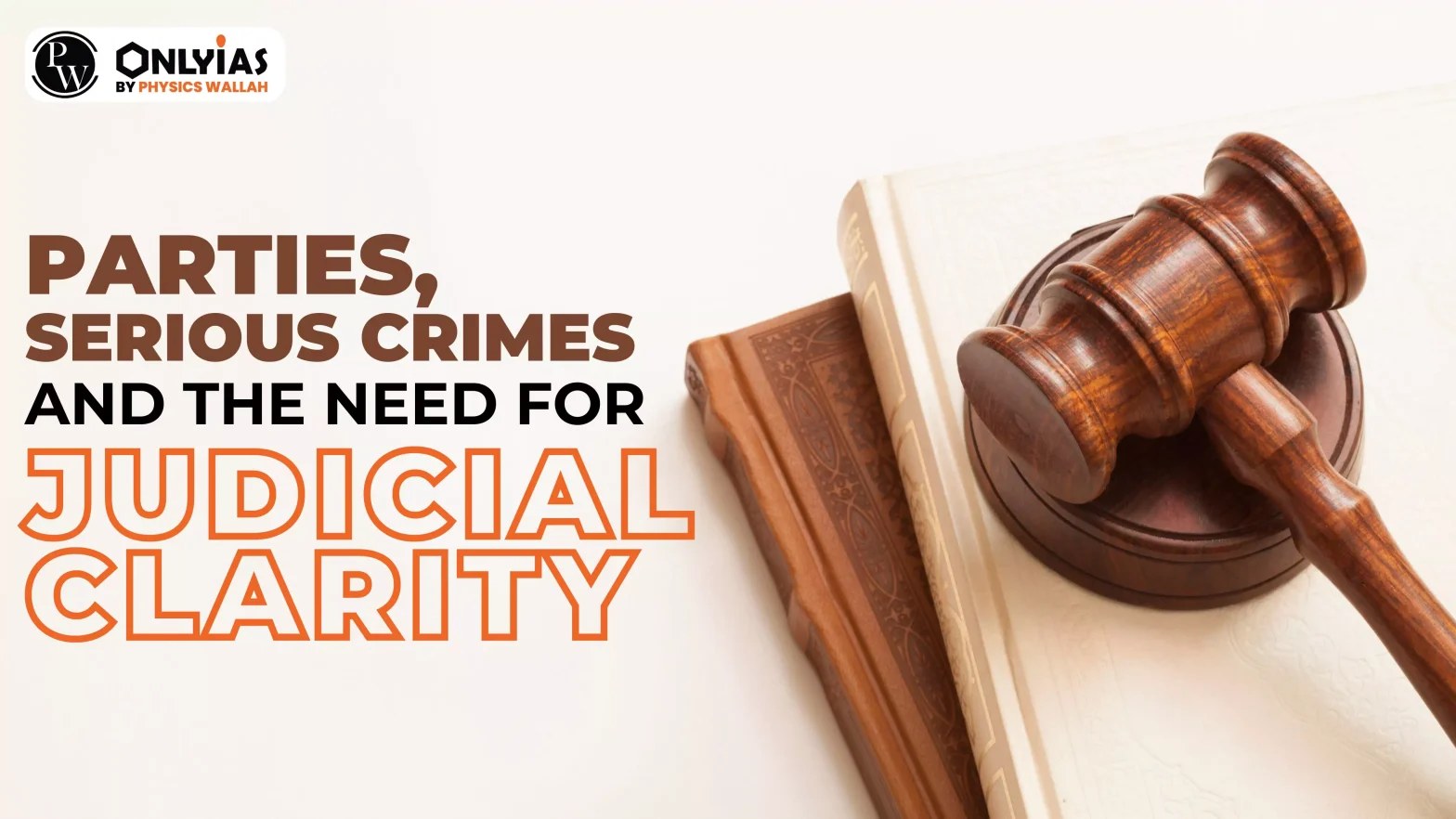Two recent observations from two different Benches of the Supreme Court of India in the bail petitions of Delhi Chief Minister Arvind Kejriwal and former Delhi Deputy Chief Minister Manish Sisodia deserve in-depth analysis.
Parties, Serious Crimes and the Need for Judicial Clarity
- The first was the observation from the Bench headed by Justice Sanjiv Khanna.
- The judge asked the government lawyer whether in a case under the Prevention of Money Laundering Act (PMLA) involving leaders of the Aam Aadmi Party (AAP), the party too is not involved.
- What is the role of the political party?
- Can it be made an accused party?
- These questions from the Bench prompted the Enforcement Directorate to make AAP too an accused party in Mr. Kejriwal’s case.
- It is perhaps for the first time that a political party is being made as an accused under the PMLA.
- In a parliamentary democratic system, where political parties play a pivotal role in mobilising people on the basis of ideologies and political programmes and run a government, making them the accused in serious criminal cases is fraught with grave problems.
Enroll now for UPSC Online Course
An Analysis, in Legal Terms
- Let us look at this issue academically and not present any argument in favour of or against a particular case. So, let us analyse it in terms of the relevant legal provisions.
- Newspaper reports show that the investigative agency invoked Section 70 of the PMLA to rope in the AAP.
- This section deals with offences by companies.
- The gist of this provision is that if the person committing a contravention of any of the provisions of the Act is a company, then every person who was in charge of the company shall be deemed to be guilty under the Act and shall be proceeded against and punished accordingly.
- In this section, there is an explanation which says that ‘company means any body corporate and includes a firm or other association of individuals’.
- Where does a political party come in under this definition?
- The investigative agency reportedly picked up the definition of political parties from The Representation of The People Act (RPA), 1951 and brought it under Section 70 of the PMLA.
- Section 29A of the RPA 1951 defines a political party as “any association or body of individual citizen of India calling itself a political party….” Under this definition, an association or individual citizen of India becomes a political party only when it calls itself a political party.
- So, all associations of individuals cannot be treated as political parties unless they call themselves a political party.
Policy and Criminality
- The second observation is from a Bench of Justice B.R. Gavai and Justice K.V. Viswanathan in a bail petition of Mr. Sisodia.
- The Bench, with its characteristic incisiveness, asked the lawyer of the Enforcement Directorate: Where do you draw the line between policy and criminality?”
- This is the most relevant question that comes up in a case arising out of a policy framed by a cabinet.
- The Constitution has adopted the British system of parliamentary democracy, with the cabinet form of government for the Union and the States.
- Ivor Jennings, the renowned authority on constitutional law, says, “in substance the cabinet is the directing body of the national policy”, it may be a good policy or a bad one.
- In case a bad policy is made, it may be disapproved by Parliament or the Assembly, as the case may be.
- And, ultimately, the cabinet is accountable to the people.
- They can punish the government and the party which runs it if the policy is harmful to them.
- But under no circumstances does the judiciary examine the correctness or otherwise or the motive of a policy made by a cabinet.
- The Supreme Court has consistently taken this view.
- So, no criminality can be attributed to the cabinet for a policy made by it.
- Therefore, a criminal charge against an individual Minister for a decision taken by the cabinet is legally unsustainable and is unheard of in the history of the cabinet form of governments.
- Of course, a Minister as a public servant becomes culpable for an individual action which is in violation of law, but not as a part of the constitutional entity like the cabinet which has framed a policy.
Check Out UPSC CSE Books From PW Store
Implications of Making a Political Party an Accused Under the PMLA
- Political Vendetta: Political parties may face heightened scrutiny and legal challenges, impacting their functioning and public perception.
- Hamper Democratic Process of Decision Making: The focus on legal issues may divert attention from policy-making and governance, affecting overall political productivity.
- Challenges Separation of Powers: Making political parties accused under criminal statutes could lead to concerns about judicial overreach and the extent to which courts should involve themselves in political matters.
- Affect Nature of Political Party: Making a political party an accused under the PMLA can potentially altering the way political entities are scrutinized and held accountable for financial irregularities, similar to profit making private organisations.
Conclusion
The judicial scrutiny of political parties and policy actions reveals complexities in attributing criminality and raises significant legal and constitutional concerns for democratic governance.
![]() 12 Aug 2024
12 Aug 2024
